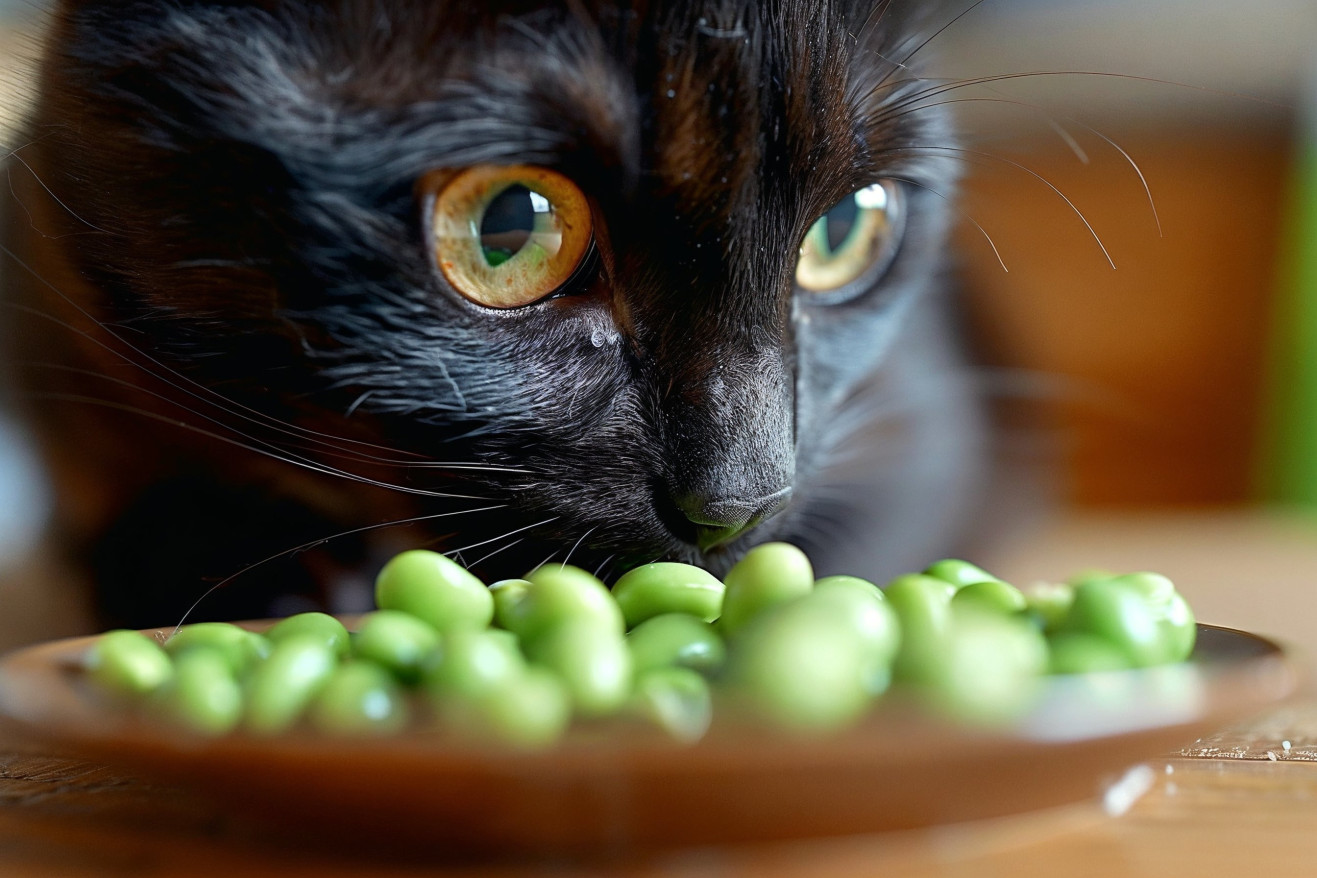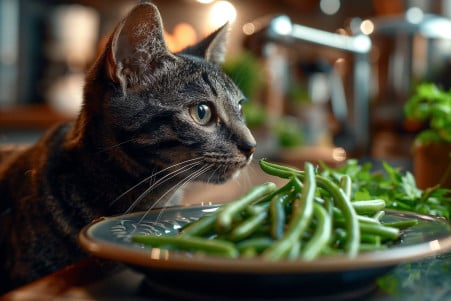Can Cats Eat Edamame? The Pros and Cons Explored
1 April 2024 • Updated 1 April 2024

Are you thinking about sharing some of your edamame beans with your cat? While cats are obligate carnivores and should not eat a lot of plant-based foods, edamame can be an okay option for cats in small amounts. The soybeans are a source of protein, fiber, and nutrients like vitamin K that can be good for cats when consumed in moderation.
Of course, we all want to make sure that we're keeping our cats as healthy and happy as possible. So, to help you decide whether or not you should let your cat eat edamame, we've looked at information from veterinarians, feline nutritionists, and studies that have looked at the impact of soybeans and plant-based proteins on cats. This way, you can learn about portion control, potential dangers, and other options that you might want to try when you want to give your cat something new to eat.
Can cats eat edamame?
Nutritional Benefits and Risks of Edamame for Cats
Edamame may offer some nutritional value to cats in moderation, as the immature soybeans are a source of protein, fiber, vitamins, and minerals. However, cats are obligate carnivores and don't have the enzymes necessary to break down the plant compounds that are prevalent in edamame. While not toxic in the short term, regular consumption could cause gastrointestinal upset or allergic reactions in cats that haven't adapted to soy.
In addition, edamame is a source of isoflavones and complex carbohydrates that aren't consistent with a cat's carnivorous diet. While a small amount may pass through the digestive system with minimal irritation, eating more than a few pods could potentially cause a blockage or injury due to the fiber and other indigestible components. Even in small quantities, isoflavones could impact the absorption of essential amino acids, which could disrupt a cat's meat-based diet. As a result, it's important to talk to a vet before giving a cat any new food, including edamame, to make sure it's safe and meets their nutritional requirements.
How to Safely Feed Your Cat Edamame
If you're feeding your cat edamame as an occasional treat, it should only account for 5-10% of your cat's daily caloric intake, according to Hepper. Before giving edamame to your cat, make sure it's cooked and unseasoned, as raw or undercooked beans can lead to gastrointestinal upset, according to Waldo's Friends.
You should also remove the shells from the edamame before feeding it to your cat, as they can be a choking hazard and cause intestinal blockages if swallowed, according to Catster. Finally, make sure to introduce edamame to your cat gradually and in moderation, while keeping an eye out for any adverse reactions or digestive issues.
It's also important to talk to your vet to get their input on the appropriate portion size for your cat based on their age, weight, and health status, according to the experts cited in these articles. If you follow these tips, you can feel good about giving your cat edamame as an occasional treat.
How to Tell If Your Cat Is Allergic to Edamame
As with any new food, edamame could cause an allergic reaction in some cats, especially those who are allergic to soy or other plant-based proteins. Animal Gator notes that signs of an edamame allergy in cats include vomiting, diarrhea, itching, skin irritation, and difficulty breathing. If you notice any of these signs in your cat after giving them edamame, it is important to discontinue the food and contact your vet immediately, as the experts mentioned in this Medium article point out.
If your cat has a history of allergies or digestive problems, it is best to avoid giving them edamame, even in small amounts, according to the information in this Medium article. It is also a good idea to keep an eye on your cat and introduce new foods slowly to see if they have any allergies or intolerances. By paying attention and working with your vet, you can make sure that your cat is safe when you are trying out new treats.
Exploring Healthier Treat Options for Cats
While some cats can have edamame as a treat, it’s important to make sure that you are focusing on a balanced, carnivore-appropriate diet, as Hepper points out. Healthier treats for cats include cooked, unseasoned meats such as chicken, turkey, or fish, which give cats the animal-based proteins and nutrients they need, according to the information from Catster.
Another option is to use commercially available cat treats that have been created by veterinary nutritionists, which can be safer and more nutritionally sound, according to the experts in these articles. In addition, playing with your cat or using puzzle feeders can be a way to reward your cat without using food-based treats, as Animal Gator points out.
It’s important to work with a veterinarian or a feline nutritionist to make sure that you are choosing the best treats for your cat’s individual dietary requirements and likes and dislikes, as the research sources all suggest. By making sure that you are focusing on these healthier options, you can make sure that your cat is getting the nutrition that they need while still enjoying a treat from time to time.
Conclusion: Should You Feed Your Cat Edamame?
While cats can technically eat edamame in small amounts, it's not the best choice of food for your feline friend. Although edamame does have some nutritional value, including protein, fiber, and vitamins, cats are obligate carnivores and their bodies are not designed to process plant-based foods on a regular basis.
As Hepper explains, edamame should not be a regular part of a cat's diet because it can cause digestive problems when eaten in large amounts. The fiber in edamame can lead to gas, bloating, diarrhea, or constipation in cats. In addition, some cats may be allergic to the soy-based compounds in edamame.
Animal Gator points out that while edamame is not toxic to cats, it's not part of their natural diet as carnivores. While feeding your cat edamame as an occasional treat in small amounts is unlikely to cause any problems, it should not be used as a substitute for your cat's regular food.
Waldo's Friends suggests that if you do decide to give your cat edamame, it should be cooked and unseasoned. It should also be given without the pods, which can be a choking hazard or cause an intestinal blockage if they're eaten. Edamame should make up no more than 5-10% of your cat's daily calories.
In the end, while edamame can offer some small nutritional benefits to cats in moderation, it's probably best to focus on feeding your cat a balanced, meat-based diet and looking for healthier treats that are more in line with a cat's natural diet.


